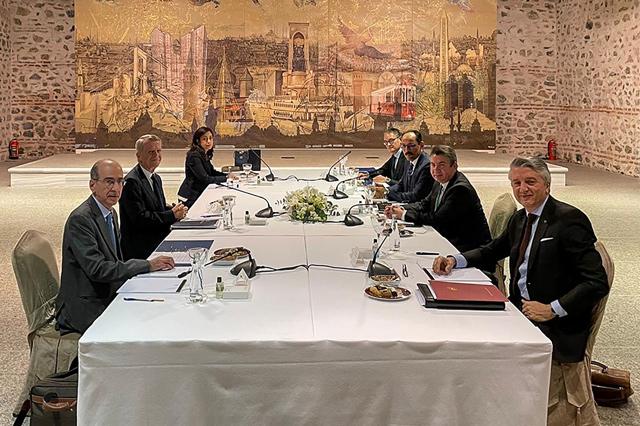- International News
- Tue-2021-01-26 | 07:12 pm

Nayrouz News Agency : Greece and Turkey bowed to EU pressure on Monday and locked horns in the first direct talks in nearly five years over their explosive eastern Mediterranean standoff.
The three-and-a-half hour meeting ended without a breakthrough after the uneasy NATO neighbours’ gunboats collided in August as their dispute over energy and borders threatened to spiral out of control.
It was held behind closed doors in Istanbul while the Greek and French defence ministers met in Athens to sign a diplomatically-charged deal for Greece to purchase 18 Rafale fighter jets.
Greek Defence Minister Nikos Panagiotopoulos said the 2.5 billion-euro ($3 billion) purchase "sends a clear message in several directions” — particularly Ankara.
But Turkish President Recep Erdogan has spent the past few months trying to cool the rhetoric and repair damaged relations with Europe in the face of a potentially more hostile US administration under President Joe Biden.
A Turkish diplomatic source told AFP that the exploratory talks ended with an agreement to hold the next round in Athens at an undisclosed date.
"A solution to all problems... is possible and we have full will to this end,” Erdogan’s spokesman Ibrahim Kalin tweeted as the talks broke up.
The United States said it "welcomes” the resumption of contracts while EU diplomatic powerhouse Germany called them the "positive [sign] we have been waiting for for some time”.
Disputed agenda
Athens and Ankara held 60 rounds of talks between 2002 and 2016 without resolving a dispute that has lingered for much of the past century and nearly led to war in 1996.
Hostilities flared anew last year when Ankara sent a research ship accompanied by a navy flotilla into waters near the Turkish shore that Greece claims with EU support.
Turkey is furious that Greece is using its vast web of islands to lay claim to huge swathes of the Aegean and Mediterranean Seas.
Both sides cite a range of decades-old treaties and international agreements to support their conflicting claims.
NATO has set up a hotline to stave off a military conflict and Berlin has spearheaded efforts to solve the dispute through negotiations that do not further isolate the mercurial Erdogan.
These will not be easy as Athens and Ankara clashed over their agenda last week.
Athens wants to limit the discussions — attended by retired Greek diplomat Pavlos Apostolidis and Turkish Deputy Foreign Minister Sedat Onal as well as Kalin — to continental shelf borders and the size of exclusive economic zones.
But Ankara also accuses Athens of illegally stationing troops on some of its islands and wants to discuss aerial zones — a separate dispute that saw a Greek pilot killed when his jet collided with a Turkish one in 2006.
Sanctions relief
Anthony Skinner of Britain’s Verisk Maplecroft risk consultancy said the talks stood a chance of "gaining some momentum over the coming months, given Erdogan’s current overtures to EU-27 states and domestic economic pressures”.
But he added that Erdogan was "unlikely” to fundamentally change his hawkish foreign policy stance.
The Istanbul meeting came during a sudden spurt in diplomatic contacts aimed at thawing an ever deeper chill in relations that have frozen EU accession talks Turkey began in 2005.
Turkish Foreign Minister Mevlut Cavusoglu was in Brussels for meetings with top EU officials last week and Ankara hopes for a return visit by early March.
France has led EU condemnation of Turkey’s military interventions in Syria and Libya as well as Erdogan’s support for Azerbaijan in the Nagorno Karabakh war against Armenia last year.
The EU ultimately decided to start drawing up an expanded list of Turkish targets for sanctions last month.
But the German foreign ministry said on Monday that the resumption of contacts meant Turkey "should not be burdened by new sanctions now”.













